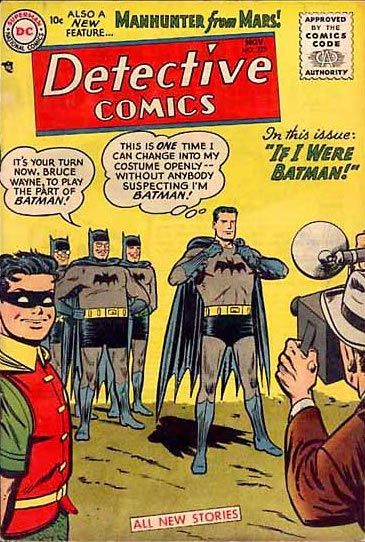The ill-considered comments made last week by screenwriter David S. Goyer highlighted an embarrassment for an intrinsic part of older superhero characters and comic books in general: A lot of them are just downright "goofy." However, there's nothing wrong with that.
Goyer's go-to ridicule of the silliness of Martian Manhunter's name, concept and origin nicely encapsulated a school of thought that's been running throughout comics for a long time. It most strongly peaked when all the wrong people misinterpreted the success of Watchmen and Batman: The Dark Knight Returns as due to an over-serious, grim-and-gritty take on superheroes that focused on distorted realism.
"What if superheroes really existed in our world?" is such a tired premise at this point, but it has proliferated to such a degree since the 1980s that it keeps getting recycled every year or so by someone, whether with an established property or new creation. I admit that, back in the day, I got caught up in that swirl of faux-maturity too. Comic books were still struggling to find respect and appreciation in broader pop culture, and this seemed like the easiest way to prove they could have artistic merit. If it wasn't completely serious, it somehow wasn't good.
In some respects, that isn't necessarily a comics problem. When a lot of people think of artistic and/or literary masterpieces, and what's recognized as such, they're almost always serious works. Moby-Dick, Crime and Punishment, Great Expectations. Citizen Kane, Apocalypse Now, Schindler's List. Somehow being an important and significant work of art or film isn't a laughing matter. As we all know, the Best Picture Oscar never goes to a comedy. However, that is easily upended as a falsehood. After all, I'm leaving out Don Quixote, The Adventures of Huckleberry Finn and Gulliver's Travels. And what about The Gold Rush, Dr. Strangelove, or: How I Learned to Stop Worrying and Love the Bomb, and Annie Hall (which did win Best Picture)? More commonly, masterpieces mix the desperate and dire with comedy, sometimes resulting in tragi-comedies, dramedies and other hybrid genres. There's really no reason to think that a lack of levity is required for acclaim. And yet, somehow too many within comics, and those reading them, did just that. (Meanwhile, a whole other corner of comics didn't have this same trappings, and was producing masterpieces like Ghost World and Love and Rockets.)
With the weight of Watchmen and The Dark Knight Returns, the Silver-Age goofiness of DC Comics was put to rest for good. Soon teeth-gnashing, back-breaking and angst were expected of every superhero comic book from DC, Marvel and most other publisher of that genre. A few exceptions existed, and more recently silliness, fun and irreverence have been making a comeback. However, the standard approach for a very healthy chunk of superhero stories are still absolute stone-cold serious to the point of dour humorlessness presented in contrived extremes of violence and titillation. The joke is that this over-compensation is sometimes funny in and of itself, although usually not intentionally. Any hint of acknowledging that silliness in the characters and their worlds is apt to be smacked down as unrealistic or too unsophisticated for modern audiences.
To be fair, DC's Silver Age was extremely goofy, formulaic and not always good. Don't mistake me for saying silly is automatically good, or the only thing superhero stories do. As much as the New 52 is criticized for its generic sameness in grim and gritty, so too could a good portion of DC's line 50 to 60 years ago be criticized for all being a bit repetitive. It's not that good equals silliness or not silliness. It's that a good story is good. A good character concept is good. Maybe it's silly, maybe it's not. If it's a superhero, it probably has a level of silliness in there, whether or not it's intentional.
Goyer's big problem with Martian Manhunter was that he would never work today. He's from Mars? That's silly, because we've landed on Mars and know there aren't green men running around everywhere. Martian Manhunter used his great powers to simply be a detective? That's silly, he should immediately set out to save or change the world. Plus, detectives aren't glamorous anymore. They work from home doing Google searches on cheating husbands. It just couldn't work today because we're all too hip and sophisticated. Martian Manhunter is just silly. Well, guess what? Yes, yes he is! Look at the cover of his first appearance in Detective Comics #225 above. I mean, Bruce Wayne is attending a Batman convention. Superheroes are silly! And that's OK. We can admit it; we can like silly things. Let's just be honest with ourselves, and maybe we'll even feel a little better. If we fess up, maybe people like Goyer won't feel the self-conscious need to ridicule those who have heard of a somewhat-obscure character, much less have an appreciation for him.
The '60s Batman TV series was absolutely despised by comic fans because it turned the Dark Knight into a goofball. Never mind that the show was genuinely funny and fun. Now that Christopher Nolan's Batman trilogy has re-established the grim-and-gritty Batman in pop culture, some of those same detractors are a little more OK with it getting some acknowledgement. The Batman '66 digital comic was celebrated upon its release for capturing the show's antics so well.
From the wry Hawkeye to the absurd Harley Quinn to the irreverent Quantum and Woody, comedy has crept back in to superhero comics, and it's a wonderfully refreshing thing.


